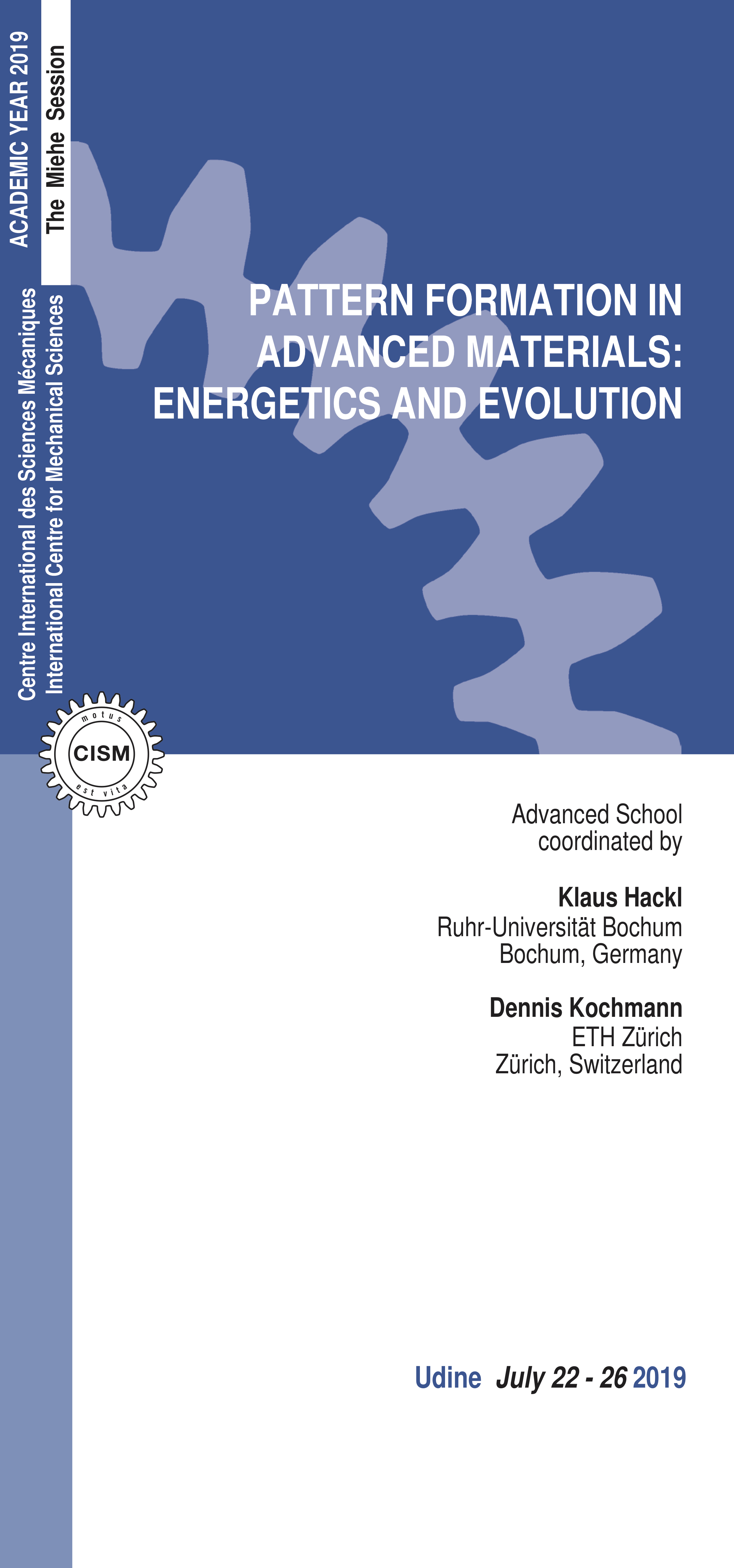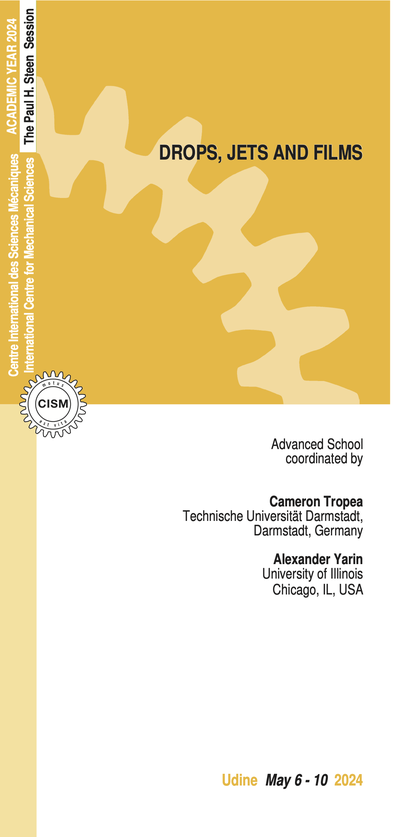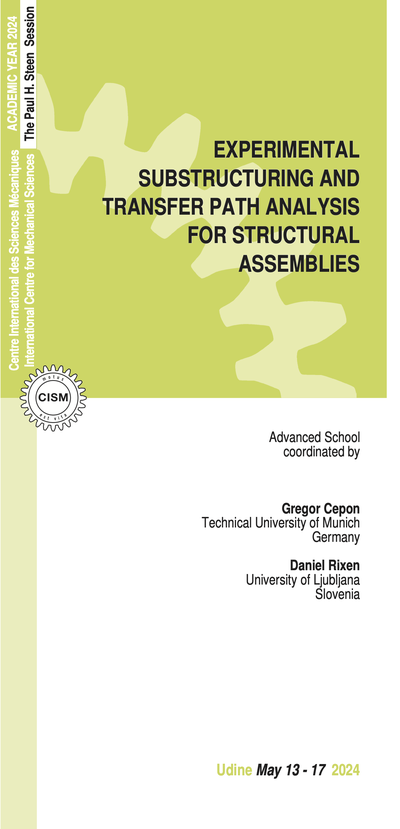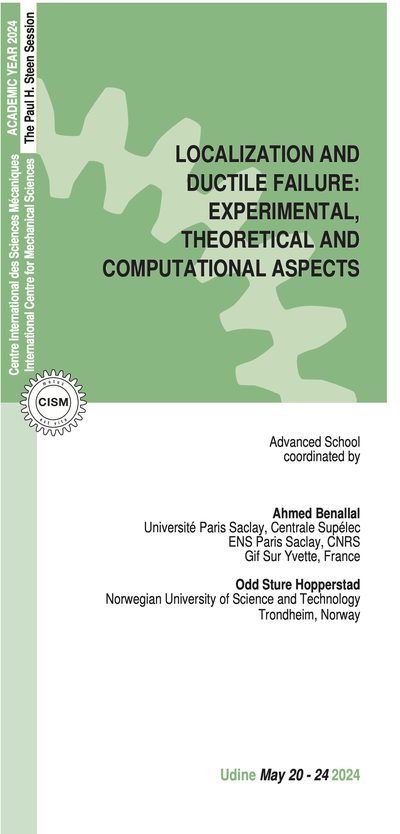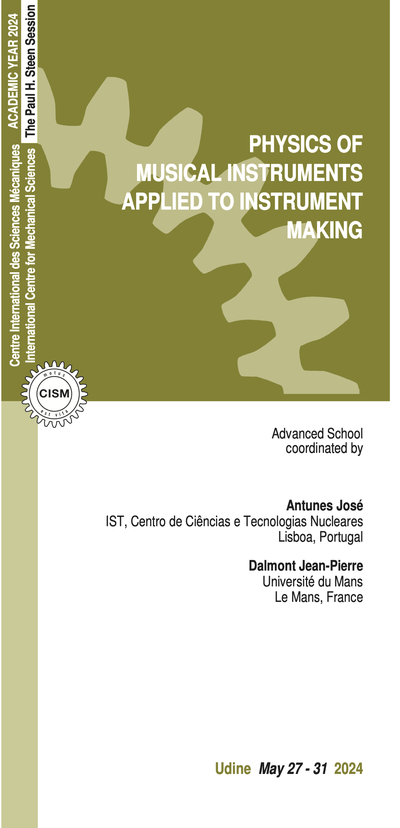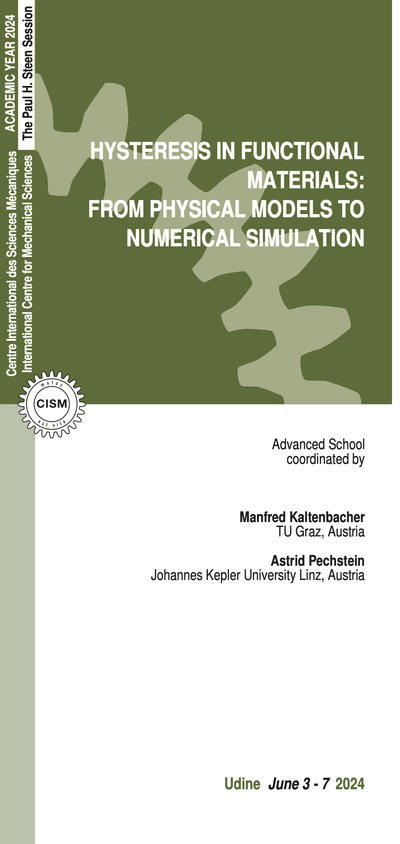In the past decades a wealth of new solid materials has emerged, designed to have very specific properties in order to offer optimal solutions to engineering problems. This evolution would not have been possible without fundamental contributions from the theoretical sciences, in particular solid mechanics and mathematics. Within this general framework, mathematical concepts from the broad context of variational analysis have proven to be successful. This spectrum of methods includes, but is not limited to, the theories of homogenization, relaxation, Gamma convergence and variational time evolution. Classical application areas involve models in the framework of nonlinear elasticity, finite plasticity and phase transformations in general and the analysis of fracture, damage, motion of dislocations, formation of microstructure and the impact of these effects on material behavior in particular.
The role of pattern formation and microstructures becomes more and more noticeable with a decreasing size of the material specimen considered. These scale effects play a major role in modern micromechanical applications. Microstructure is indeed crucial, since material behavior typically is the result of the interaction of complex substructures on several length scales. The macroscopic behavior is then determined by appropriate averages over the (evolving) microstructure. Effects controlling the lifetime and deterioration of specimens, too, depend strongly on the microstructure. What is needed are models which are more closely related to physics and material science and which are able to take into account the microstructural behavior of the material.
Mathematics and especially the calculus of variations are essential in the understanding of microstructural pattern formation in the presence of nonconvex potentials (i.e., potential energy functionals lacking weakly lower semi-continuity). Solutions to macroscopic boundary value problems become infimizing sequences whose description requires the identification of the quasiconvex envelope of the non(quasi)convex energy density, whose infimizers are interpreted as the associated microstructural patterns.
The mechanics of materials side of this course aims to exploit the above mathematical concepts towards formulating and validating constitutive theories and associated numerical tools for the prediction of complex material behavior. Since exact solutions of quasiconvex hulls are a rare find, approximate solutions from the theory of relaxation via, e.g., rank-one-convexification and sequential lamination, via convexification, via polyconvex envelopes, or via time-incremental variational formulations have served to describe the intricate micromechanical processes leading to the well-documented macroscopic inelastic material behavior.
The course is addressed particularly at doctoral students and young researchers (postdoctoral scholars, research associates and assistant faculty). The lectures will target an audience that has a proficient background in graduate-level mathematics and solid mechanics (typical of Master’s graduates in, e.g., mechanical and civil engineering, applied mechanics, applied physics, applied mathematics, and related disciplines).
Hackl: K. Hackl, U. Hoppe, D. Kochmann, Variational modeling of microstructures in plasticity. In: J. Schröder, K. Hackl (Eds.): Plasticity and beyond: microstructures, crystalplasticity and phase transitions, International Centre for Mechanical Sciences: Courses and lectures, 550, Springer, 65–129, 2014.
Kochmann: A. Vidyasagar, A. D. Tucuoglu, D. M. Kochmann. Deformation patterning in finite-strain crystal plasticity by spectral homogenization with application to magnesium, Comput. Methods Appl. Mech. Engng. 335 (2018), 584-609.
A. Vidyasagar, W. L. Tan, D. M. Kochmann. Predicting the effective response of bulk polycrystalline ferroelectric ceramics via improved spectral phase field methods, J. Mech. Phys. Solids 106 (2017), 133-151.
Bhattacharya: K. Bhattacharya, Phase boundary propagation in heterogeneous bodies. Proc. Royal Soc. Lond A 455: 757-766, 1999.
S. Xia, L. Ponson, G. Ravichandran and K. Bhattacharya. Toughening and asymmetry in peeling of heterogeneous adhesives. Phys. Rev. Lett. 108: 196101, 2012.
James: Hanlin Gu, Lars Bumke, Christoph Chluba, Eckhard Quandt, and Richard D. James, Phase engineering and supercompatibility of shape memory alloys, Materials Today 21 (2017), 265-277.
Xian Chen, Vijay Srivastava, Vivekanand Dabade, and Richard D. James, Study of the cofactor conditions: conditions of supercompatibility between phases, J. Mech. Phys. Solids 61 (2013), 2566-2587, http://dx.doi.org/10.1016/j.jmps.2013.08.004.
R. D. James, Materials from mathematics, Bulletin of the American Mathematical Society, 56 (1) (January, 2019), to appear.
Dolzmann: Müller, Stefan Variational models for micro-structure and phase transitions. Calculus of variations and geometric evolution problems (Cetraro, 1996), 85–210, Lecture Notes in Math., 1713, Fond. CIME/CIME Found. Subser., Springer, Berlin, 1999.
Dacorogna, Bernard Direct methods in the calculus of variations. Second edition. Applied Mathematical Sciences, 78. Springer, New York, 2008, Chapters II and III.
Raoult: G. Friesecke, R. D. James and S. Müller, A hierarchy of plate models derived from nonlinear elasticity by Gamma-convergence, Arch. Ration. Mech. Anal. 180, 183–236, 2006.
A. Raoult, Quasiconvex envelopes in nonlinear elasticity in Poly-, Quasi-, and Rank-One Convexity in Applied Mechanics, P. Neff, J. Schroeder Eds, CISM Courses and Lectures, 516, 17-52, Springer, 2010.
6 lectures on: time-dependent processes in heterogeneous media, homogenization of evolution equations, pinning, applications to adhesion and fracture mechanics.
6 lectures on: mathematical theory for relaxation with applications to elastic and plastic materials.
6 lectures on: fundamentals of variational methods, thermodynamic principles, evolution laws and relaxation theory with applications to prominent problems of material modeling (including damage, topology optimization and granular media).
6 lectures on: theory and applications of phase transformations in solids, pattern formation by energy minimization, microstructure evolution, comparison of theory and experiments, application to the modelling of the behavior of shape-memory alloys.
6 lectures on: energy relaxation by numerical and analytical methods with applications to pattern formation in finite elasticity, plasticity, and phase transformations.
6 lectures on: variational methods for homogenization and dimension reduction with applications to lattices and prestrained materials.
The registration fee is 600.00 Euro + VAT*, where applicable (bank charges are not included). The registration fee includes a complimentary bag, four fixed menu buffet lunches (on Friday upon request), hot beverages, downloadable lecture notes and wi-fi internet access.
Applicants must apply at least one month before the beginning of the course. Application forms should be sent on-line through the following web site: http://www.cism.it. A message of confirmation will be sent to accepted participants. Applicants requiring assistance with the registration should contact the secretariat at the following email address cism@cism.it.
Applicants may cancel their course registration and receive a full refund by notifying CISM Secretariat in writing (by email to cism@cism.it) no later than two weeks prior to the start of the course.
Cancellation requests received during the two weeks prior to the start of the course will be charged a 50.00 Euro handling fee. Incorrect payments are also subject to a 50.00 Euro handling fee.
A limited number of participants from universities and research centres who are not supported by their own institutions can be offered lodging and/or board, if available, in a reasonably priced hotel or student guest house.
Requests should be sent to CISM Secretariat by May 22, 2019 along with the applicant's curriculum and a letter of recommendation by the head of the department or a supervisor confirming that the institute cannot provide funding. Preference will be given to applicants from countries that sponsor CISM.
Information about travel and accommodation is available on the web site www.cism.it, or can be mailed upon request.
* Italian VAT is 22%.
